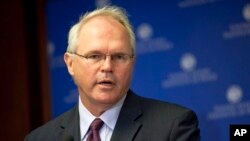Tensions are rising again on the Korean peninsula as the United States and South Korea conduct joint military drills this week. In Seoul, a former chief U.S. negotiator for North Korea nuclear talks addressed a conference on the unlikely prospects for peace in the Korean peninsula.
Every year the United States and South Korea conduct a large-scale, weeks-long military exercise involving thousands of troops, to prepare for a possible attack from North Korea. And every year Pyongyang responds with harsh rhetoric and a display of military force. This year is no different. Pyongyang fired two missiles into the sea on Monday. On Wednesday North Korea’s foreign minister warned his country has the nuclear capability to conduct a preemptive strike.
The responses by both sides reflect the fact that past diplomatic efforts have failed to reduce tensions in the region.
Former U.S. Ambassador to South Korea Christopher Hill spoke at a conference in Seoul about the prospects for peace moving forward. He said North Korean leader Kim Jong Un seems to be just as intent as his father, Kim Jong Il, on making North Korea a prominent nuclear power.
“If Kim Jong Un is interested in doing away with their nuclear weapons, let’s put it this way, he hasn’t shown that yet,” said Hill.
Ambassador Hill was a chief U.S. negotiator for former President George W. Bush in the 2000s, during six party talks with the two Koreas, Japan, China and Russia to restrict North Korea’s nuclear program in exchange for economic aid. The talks ultimately collapsed in 2008.
Since then, North Korea has conducted two nuclear tests and multiple rocket launches. The United Nations has imposed harsh sanctions on the regime in Pyongyang.
Restarting international talks are even more complicated than before. Washington has said it will not negotiate until Pyongyang takes action to curb its nuclear program.
While North Korea pours funding into the military and nuclear development, there continues to be extensive poverty and malnutrition in the country. China still provides economic support to the impoverished North but it has also improved ties with the South.
Moscow is attempting to boost ties with Pyongyang, but Ambassador Hill said this will not result in a major aid or assistance program.
“I can believe you will see some signs of sort of a Russia, North Korea rapprochement. But I think at the end of the day, I think Russia kind of is interested in seeing the money on the table and I am not sure the North Korean understands that concept,” said Hill.
Ambassador Hill said the United States and its allies must contain North Korea’s nuclear threat until the state ultimately collapses under the weight of its failed economy. At that point, diplomacy will be needed to manage the transition and to reassure China.
“I would not want a situation where there is a sort of policy view and China that somehow this would be a weakening of their strategic position, a victory for America, a defeat for China. We need to avoid that,” he said.
Military readiness remains a priority on both sides of the Korean border as tensions rise and no imminent meaningful prospects for a peace seem to be forthcoming.
VOA News Producer Youmi Kim contributed to this report.





